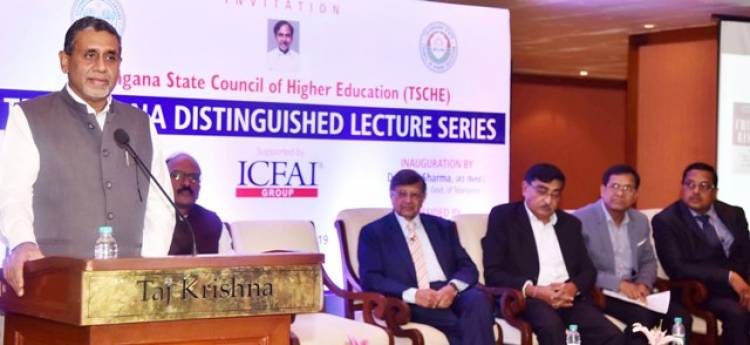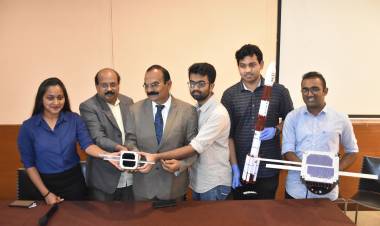Telangana Distinguished Lecture Series, kick starts with the talk by globally acclaimed strategic thinker Prof. Jagdish N. Sheth!

Hyderabad: The Telangana Distinguished Lecture Series (TDLS) is beinig organised by the Telangana State Council of Higher Education (TSCHE) Hyderabad. The lecture series was inaugurated on Monday, July’ 29, 2019 by Dr. Rajiv Sharma, Chief Advisor, Government of Telangana and would be attended by eminent educationists, policy makers, academicians and leading industry leaders. The first lecture was delivered by Prof. Jagdish N. Sheth, Charles H. Kellstadt Distinguished Professor of Marketing, Goizueta Business School, Emory University, USA and a globally acclaimed strategic thinker on the topic “India in the New World order: Opportunities for Telangana.” Prof. T. Papi Reddy, Chairman, TSCHE & Prof. V. Venkata Ramana, Vice-Chairman, TSCHE & Program Coordinator, were also present on the occasion.
Speaking on the occasion Prof. Jagdish N. Sheth said, isn't it ironic that the official car of the British empire, Jaguar, the most pervasive, dominant empire in the world, which conquered the globe, that brand is owned by an Indian enterprise called TATA motors, this is the new world order, that's the point I wanted to make. The best thing we can do is to give up the old ideas that we learnt and practiced and embrace something new. Telangana is destined to become one of the rising stars because of its key advantages, it's a small state; its a can do state, it believes in its future, it believes when opportunity comes its willing to take, it's going to do very well in my analysis on all three fronts of agriculture, manufacturing and services centric and the state will do very well for a bunch of reasons. Infact for several key industries Telangana will become Indian capital. In the old world order as on 1987, 75% of the world GDP was controlled by 15 countries of US, Canada, Western Europe and later entrant was Japan, 45% of world trade was within these nations and all of them are aging rapidly, hence they will come outside and invest. The world balance of power was between Communism and capitalism and we choose a third front the Non alignment as we were not willing trust the former colonisers or embrace communism, which itself was an opportunity we missed out, that's because when the allies became the victors they ramped up the demand for manufacturing enormously, had no local resources to manage, especially people resources and therefore they wanted to outsource manufacturing in the early 50s and the target nation was India, because we already knew how to take our raw material and do value addition two key industries of textiles and steel mills under the British empire, which is why we are so good in textiles and steel. We had the same accounting system and the legal system, we understood the banking system properly because it was all organised by the British in the British system and were compatible with the American system, the entire thing was converging together and we missed that boat. We would have been the largest manufacturing nation in the world, there would have been no Taiwan, no Korea, no Japan, no China, because we would have become the manufacturing capital of the world. We had all the assets, this is a land of milk and honeys, agricultural assets, industrial raw materials and people, so all the 3 factors of production is here. One 4th factor and most critical was entrepreneurship and India is blessed with entrepreneurship. To me if there is any raw material in sheer abundance is number of entrepreneurs. I would say three communities the Telugus, Gujaratis, Punjabis are entrepreneurial by nature. All of this has changed unfortunately now, the biggest change agent is in the collapse of communism, nobody anticipated that. Only nation which transformed is China, the same communist party became capitalist. The major thing that has happened is smart phones, India's transformation is more to do with smart phone domination than anything else. Today with 4G architecture Smart phones become so affordable that the rural urban divide is just not there and technology has become a level playing field. In fact The ruralites because of their lifestyle have more disposable income at their command. The other things which changed the world are rapid aging of advanced nations, terrorism has gone global and now we have new leaders like Modi, Trump, Xi, they are very different, they don't have the typical legacy of elite or political dynasties, they think differently. That is a major change, these are the new leaders of the world who will shape the economies of their nations very differently. Here is the new world order, which is why India is becoming so strategic to the world. The new triad power, which is India, China, USA are replacing countries like Japan, Germany, French, England. Interestingly India is becoming very strategic to both major superpower US and China. Us is desperate to have India on its side, earlier we needed America, today US needs India more than ever before for its strategic interest and China needs India as badly. Now we have to decide which way should we align or should we align at all. New power China and India are becoming important because largest consumer markets are China and India and Chinese and Indian consumers will dominate. 65- 70% of all economies are driven by consumer market and not by Industrial or Government or defence markets. Its defence which is the second major area where India will grow and Hyderabad has the option to become the opportunity of becoming the defence capital of India. Not necessarily Bangalore, as it is in serious trouble because of political instability, infrastructure nightmare right now, it all grew without proper planning and it might lose its IT services and others to some other city and that city is likely to be Hyderabad. China is definitely emerging as a super economy and there is nothing America can do to slow it down, except for some war. If there is spark of any kind of a war, than that is now in Asia. Usually wars are instigated by outsiders not by insiders. Nuclear weapons are no longer the deterrent, the deterrent is making these three economies as much interdependent on each other, invite capital, invite people, than you have a perfect hostage holding. If something happens to your people and assets in a foreign land significantly, your domestic politics get impacted. Discord among traditional allies will impact relationships. Populism will rule the world and countries suffer from that. Capital markets are in turmoil, equity and debt markets are not the future for the next wonder kid private equity will rule the world and how to attract them and make them invest will become critical.
Prof. Jagdish N. Sheth said, Why India is destined to become strategic globally. Both China and USA consider India to be strategic for their future. India has all the ingredients but does not have a recipe. The recipe is the vision with a mission. Vision is all about positioning for the future. Vision is aspirational, proactive and mission driven. India's main ingredient is the big large consumer market, which are growing fantastically because all consumer economy was unbranded products distributed through unorganised sector, now all becoming branded products distributed through organised sector. GST is having a major transformation out of nowhere, technology is having a major transformation out of nowhere.
What I find fascinating compared to my days is positive self image, we believe we can do it. World is embracing people of Indian origin, which is why the third major point is we have a huge global Diaspora, which we have not learnt to leverage properly. It can be an organised force to enable India in its globalisation. We have a massive digital talent, we have a language advantage before China becomes an English speaking nation, which they will do by policy, while ours is a market driven rather than policy. Surprising we have never leveraged our external affairs ministry properly, we need to have deep diplomatic relations with strange bed fellow. We know Iran, Russia, Myanmar better than anybody, so my advice to the Government is, future is no more cold war mentality, your diplomats have to be trained to be economic ambassadors not just political ambassador, delegate passport, visa jobs to automation. Leverage the foreign services to promote India positively. We are strong growing soft power, we need to embrace high quality standards to become powerful. We are a strong military power, the high esteem their counterparts in the world hold our armed forces in is enormous. What is going to happen is, India which was a isolated economy in the license raj is now becoming globally integrated and from a regional diplomacy like a SAARC, we have to become a diplomatic influence on a global platform. Can we be at the table not at the side of the table is key to our growth.
Regarding Telangana Prof. Jagdish N. Sheth, I have learnt from Singapore, smaller you are the more you have less constraints, you can do better. Telangana can leverage by becoming a hub for not just IT services but all professional services. This can be hub for accounting services, Health services, legal services. Attract global defence companies, this will become one of the global capitals. Leverage global diasporas as much as you can, especially the ATAs, NATAs. Send industry focussed delegations globally, general delegations don't help. Become an entertainment capital, leverage Tollywood, which is very good, with massive infrastructure here. Upgrade bureaucracy, they are brilliant people leverage their talent for bigger things and retain them as paper pushers. Modernise agriculture and make it more productive and remunerative. Hyderabad can become the services capital of the world by positioning yourself correctly.
Earlier Dr. Rajiv Sharma said, we would hear some insights on the changing scenario countries across the globe from Prof. Jagdish N. Sheth, which we are facing in the shape of new world order, which is a dynamic term and the definition and context of which keeps changing from time to time. In the era immediately after the two world wars, the new world order emerged with institutions like the UN, IMF and World Bank being born, to usher in a new era known as new world era. Then came the cold war and the talk of the bipolar world and finally we witnesed the globalisation and institutionalisation of the world trade through institutions like WTO and so on saying globalisation is dead. So what new world order will emerge is any body's guess. This is something with which we are constantly struggling as nation economies and India too has a big challenge and we need to find how to keep pace with these developments in international economic arena. Telangana is the newest state of India and its proving to be a good example of how smaller states can do well in the overall context of Indian economy and polity. There has been a constant increase in the creation of new states and gradually there is a tendency to realise the local aspirations, the needs of local economy, the need to utilise the local resources for its own development and growth, which sometimes gets neglected in the very big state. So creation of Telangana is a matter of history now, but we have done well in the last 5 years which has been seen in many indicators like the growth rate of Telangana at the current prices is 14% which is well above the national average, despite it was not well endowed with the irrigation facilities and most of the economies in India have grown on the basic pedestal of agriculture, Telangana was deprived of that, we are still maintaining this growth rate thanks to the good economic environment this state provides for businesses Industry and service, sector. The per capita income has also risen by 13.3% at current prices which is also the highest in the country. The state's own tax revenue saw a phenomenal increase of 26% last year and 20% this year and this has been a consistent story for the last five years after the state was born. The total revenues of the state including the GST, which was a shock in terms of growth of revenues also has been 21% and is pretty encouraging. The growth of urban population has been very remarkable, which shows the shift of the population in terms of economy and now the present percentage of urban population is 42% and may well reach 48 t0 50% very soon by next census. Which shows that the employment pattern and opportunities are shifting from rural to urban and this migration is just not from the rural areas of the state but from all over India to cities like Hyderabad. We see very good indicators of growth and opportunities blossoming in Telangana. Telangana has the advantage of a huge land bank, 300 industrial parks were developed here in about 1.2 lakh acres of land and still there is a huge repository of land with the state government which can be used for the growth of Industry and services. When Telangaana was formed we took it as a challenge to improve our ranking in ease of doing business, in 2015 we were 13th in the country and became 1st and continue to maintain 1st or 2nd rank, which paid dividend and growth of investment has been very remarkable. We brought a policy called TS iPASS, which was mainly based on self certification by the entrepreneurs and investors rather than they coming to government offices for license and certificates, it had a time bound window clearance of within 15 days we cleared mega projects and 30 days for clearing the other projects, this way the state government was accountable to investors and also was particular to cut the red tape, other delays and corrupt practices in giving permissions for industry. We identified 14 thrust areas for incentivising growth of industry in Telangana, like life sciences, electronics, aviation, aerospace and defence, food processing, semiconductors, textiles and apparel. palstics and polymers, FMCG etc. Telangana is the 2nd largest IT exporter in India. We have given through iPASS 7900 clearances of which most started operations and around 140000 crs investment came to the state and provided employment to 8 lakh people. There are great advantages which can be tapped in Telanagana, the state is recognised for low cost of doing business, there is plenty of power availability, 10% water is being ensured under the project of mission Bagirath for industry, good availability of lands in industrial parks, good connectivity with good roads, has skilled workforce, which all help us to connect seamlessly and effortlessly with the national and global economy in the new world economic order.
Prof. T. Papi Reddy said, TSCHE has taken up this initiative to organise a series of lecture to benefit the students, scholars and the Telangana society at large. Till 1990 Indian economic was inward looking with socialism asa guiding principal. But certain developments in the late 80s and early 90s, the India government of late PV Narasimha Rao, took bold decisions to open the economy
Prof. V. Venkata Ramana, while welcoming the guests said, the series of lectures is an initiative to take Telangana to the next level through intellectual activism, by involving various stakeholders in the endeavour to make this state Bangaru Telangana. The lecture is being attended by eminent educationists, policy makers, academicians, leading industry leaders not only from Telangana but from all over India. Since then our economy has been gravitating towards world economy. After the advent of WTO the rules of trade and economic relations among the countries has changed drastically. One likes it or not, the international economic order is what we need to follow. We need to integrate with the world order and take advantages from within the system. Our focus today is on make in India, we need to lay foundation for a vibrant industrial base and Telangana since its formation has been striving hard to create a strong Industrial base in Telangana. Hyderabad is strongly emerging as a hub of education and industry and we should capitalise on the opportunities that arise and face the challenges and overcome them in accomplishing our mission.
Prof. Jagdish N. Sheth is known nationally and internationally for his scholarly contributions in consumer behavior, relationship marketing, competitive strategy, and geopolitical analysis. Professor Sheth has over 50 years of combined experience in teaching and research at the University of Southern California, the University of Illinois, Columbia University, MIT, and Emory University.
Throughout his career, Professor Sheth has offered hundreds of presentations in at least 20 countries. He has also provided consulting for numerous companies in the United States, Europe and Asia. His client list includes AT&T, BellSouth, Cox Communications, Delta, Ernst & Young, Ford, GE, Lucent Technologies, Motorola, Nortel, Pillsbury, Sprint, Square D, 3M, Whirlpool, and others. Professor Sheth has also served on the Board of Directors of several public companies including Norstan, Cryo Cell International, and Wipro Limited.
Professor Sheth’s accolades include “Outstanding Marketing Educator,” an award presented by the Academy of Marketing Science, and the “Outstanding Educator” award twice-presented by Sales and Marketing Executives International. Professor Sheth is also the recipient of all four top awards given by the American Marketing Association: the Richard D. Irwin Distinguished Marketing Educator Award, the Charles Coolidge Parlin Award, the P.D. Converse Award for outstanding contributions to theory in marketing, and the William Wilkie Award for marketing for a better society.
Professor Sheth is a Distinguished Fellow of the Academy of Marketing Science, Fellow of the American Psychological Association (APA), and a recipient of a Distinguished Fellow award from the Internati onal Engineering Consortium. He has authored or coauthored several hundreds of articles and several books including Clients for Life, Tectonic Shift, Firms of Endearment, Chindia Rising, The 4 As of Marketing, Breakout Strategies for Emerging Markets, and most recently, The Sustainability Edge.
The lecture series is supported by ICFAI University, Hyderabad. Prior to the lecture there was a Deans & Directors Conclave of leading Business Schools to deliberate about emerging and future of Management Education. Prof. Sheth delivered a talk on “Repositioning of India’s Higher Education.”

















